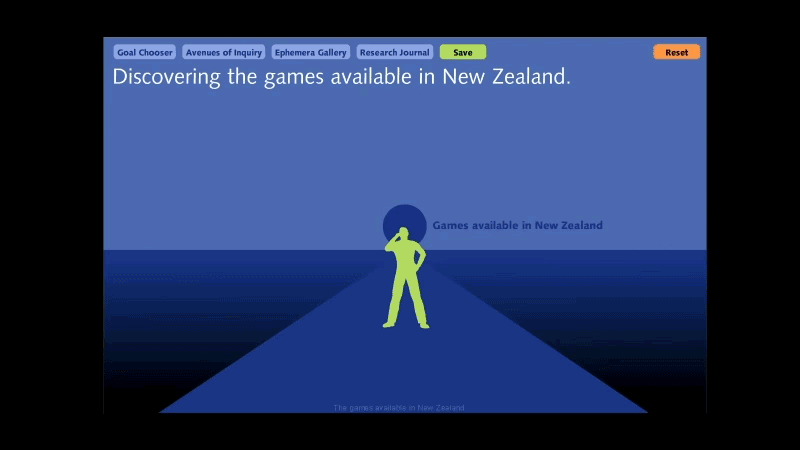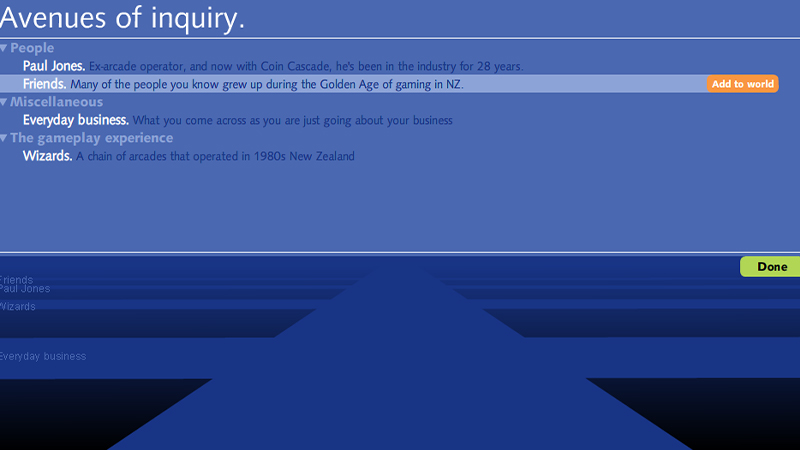Cast-offs from the Golden Age is built in opposition to the idea that "[t]he history of entertainment technologies, so the media and technology industries would have us believe, is best framed as a series of creative and technological triumphs, moving inexorably toward faster processing, increasingly realistic graphics and more engaging forms of interactivity. Like the film industry, game companies would probably prefer we didn't think in terms of history at all, choosing instead to situate themselves on the brink of a perpetual future, looking forward to the next big thing rather than contemplating how we got here. Heroic attempts to recapture some of the rapidly fading history of the game industry – from JC Herz's Joystick Nation to Van Burnham's Supercade – have appeared from time to time, but usually with a focus on North American and Pacific Rim game industries and always seeking to map a comprehensive history of progress toward the present.
However, the stories that historians choose to tell about the past are often inextricably entangled with their own personality quirks and idiosyncratic obsessions. If we are honest about it, the narratives we pursue probably consist of as many dead-ends, digressions and anachronies as neatly packaged elements of a grand historical narrative. It is a rare work of history that not only acknowledges this, but seeks to weave it into the fabric of the historical work itself, becoming a strength rather than a liability. So it is with Melanie Swalwell's Cast-Offs From the Golden Age, created in collaboration with Vectors Art Director Erik Loyer.
In order to experience the largely unexamined history of video games in New Zealand, Swalwell asks us to retrace some of her steps – and occasional missteps – in seeking to discover this arcane and fragmented history. Swalwell's project refuses to deliver a comprehensive history, choosing instead to allegorize the research process by embedding bits of information within an information space. The implication is that, following Michel Foucault, all history is rightly conceived of in terms of fragmentation and partiality. The seductive narrative of the definitive, totalizing history is both mendacious and misleading. Swalwell's investigation is part exploration and part role-playing-game, as different facts reveal themselves with each traversal of the research space. Although probably a source of frustration for 'Dragnet historians' (those hoping to receive 'just the facts'), the rewards of engaging fully with the dynamics of Swalwell and Loyers possibility space are as formidable as that of any totalizing historical narrative." -- Vectors Journal Editorial Staff
Author's Statement
"In 2004, I was invited to undertake background research for a museum exhibition GamePLAY, on the history, art and science of digital gaming in New Zealand. I was to focus on finding the New Zealand dimension and/or context for each of these areas, something that presented a challenge for me as an outsider: I didn't have my own experiences or knowledge gained from growing up with this history happening around me, in this place, and it was sometimes tricky to sort out the quite understandable desire to have a local focus, from any inclination towards national exceptionalism. This stipulation, however, turned out to be something of a gift. Had I not been required to look into these New Zealand specific questions, it is unlikely that I would have pursued the overlaps between the local and the non-local -- issues such as the dates that particular international games systems arrived in New Zealand -- to the extent that I did.
What I found was that there were significant differences between the accepted accounts of games history -- typically told from U.S. or Japanese perspectives -- and the history of digital games in a place like New Zealand. Researching a history of a place distant from these 'centres' offers the opportunity to realign some of the taken for granted 'facts' or references in surprising, and sometimes quirky, ways. Two quick examples serve to illustrate how different things look when viewed from the 'periphery'. 'The crash' is a well-known games history phrase, referring to the 1983 downturn in the industry. In New Zealand, however, 'the crash' is almost always a reference to the 1987 stock market crash, which had significant implications for the country, and sent a number of companies -- including some involved in videogame production -- under. And although Atari was in serious trouble in the U.S. in 1983, New Zealanders didn't discover the delights of the 2600/7800 systems -- released in the U.S. in 1977 -- until the mid 1980s, when the stock was likely dumped here cheaply.
Setting out to search for material pertaining to the local situation, I quickly found that there was little standard textual material on the subject, and even less in the way of material artefacts housed in New Zealand cultural institutions. This meant that I had to get creative and innovate as far as research methods were concerned. Ephemera collections quickly proved to be one of the best sources of information about games in New Zealand: the bits and pieces that many people wouldn't consider worthwhile, stuff like old advertising catalogues that is usually discarded, yielded a wealth of rich, primary source material. Asking people I knew and met what their history with digital games was, also proved useful. Often, people I approached doubted that they would know anything of significance, but sometimes what they would tell would introduce new angles or even whole areas that I hadn't realised I needed to inquire about. (This was also one of the great joys of visiting paper-based ephemera collections: their ability to seduce and productively pull one off course.) Over time, snippets from one conversation have become meaningful in the context of others. One of the best sources, of both ephemera and personal knowledge has, of course, been private game collectors, those individuals with the foresight to collect what the rest of us throw away.
Castoffs from the Golden Age utilises samples of the ephemera I have sourced from both public and private collections, together with a range of other fragments to reconstruct and dramatise the research process for the user. The user is invited to step into the shoes of the researcher, seeking after information that will allow them to achieve their goals. Of course, research isn't only about completing goals: also part of the process and the experience are the moments of excitement at a serendipitous discovery, the frustration at dead ends or confusion at knock backs received, a wondering about where to turn next, or the sense that there are just too many avenues of inquiry to pursue. Finally, there is the interpretive work of piecing together fragments gleaned from a range of sources. To have been able to experiment with analogues between a researcher's process of conducting research and making sense of the resultant information, and the experience of users of multimedia has been one of the great pleasures of this project.
To conclude, a few reflections on the computer in all this are warranted. In the summer of 2005, I trialled using a qualitative software package to keep track of the very many sources, pieces of information and insights, and how they were linked, because sometimes there is just too much to keep in one's head. Though the promise of the computer as aide memoire is enticing, I found my commitment to entering every piece of data didn't last long: I realised that it was no guarantee against my forgetting the (for me) all-important links between various fragments and ideas, and though having them stored in a computer was comforting, it didn't speed up the process of my working them through. I know this now about my practice, nevertheless, it was an interesting exercise and one that brought the figure of interlinked nodes vividly to life for me. I also know now that even when I forget one of these links or a piece of information, it is likely that I will come back to it, if by a different path, owing to the rich network of connections of which it is a part. By contrast, I like very much that we have not presented the many disparate ideas and fragments of which this piece is comprised in this way, as a highly structured and interlinked series of nodes. Rather, it is individual users who will bring these nodes and built up networks forth, via the resonances they feel, the sense they make, and the connections they draw as they navigate the work." -- Melanie Swalwell, Vectors, Volume 2, Issue 1, Fall 2006
Designer's Statement
"From the beginning, Melanie Swalwell was interested in making Cast-offs from the Golden Age an experience that would be eloquent of the ambiguities and loose ends of the research process. Ambiguity doesn't 'just happen' in digital interactivity, however -- it must be constructed out of well-defined structural elements which are fine enough in resolution to enable fluid recombination, yet coarse enough to signify recognizable ideas. The process, as a result, is thoroughly counter-intuitive with respect to its objective.
A project like Cast-offs is heavily database-driven for a number of reasons, the most important of which is the organic quality which a dynamic content storage medium lends the entire process. We aim to create original works for Vectors, not adaptations, and as such the writing (and rewriting) process must happen concurrently with the design and programming--a tight feedback loop between the three is essential if the final piece is to be truly responsive to the demands of the medium.
The database, of course, must be designed, and it can be a challenging process -- essentially the task is to create a rough (very rough) analogue to the concepts and ideas a scholar has been developing over the course of many years. Furthermore, since in this case the process was being applied not just to a conceptual framework Melanie had developed, but to her own lived experience as a researcher, she had all the justification in world to reject the crude, rigid abstraction of life represented by the database design.
Fortunately, this proved not to be the case, and Melanie gamely threw herself into the formidable task of translating her experience and work into the rows, columns and relations of the database, enabled by our excellent data entry tools engineered by Craig Dietrich, tools which adapt instantly to changes in the structure of the database and greatly enhance the fluidity of our development process.
One of the joys of a project like this is reaching the point at which all the analysis and categorization involved in the design process gives way to the constructive and creative activities of experience-building. At some point one's fluency both with the tools and with the emerging characteristics of the system being built become subconscious to the point where the rightness or wrongness of a particular element can be intuited. Many thanks to Melanie and to all the scholars we work with for being open enough to an unfamiliar process to allow those moments to occur.
Further, I would like to thank Chad Corbin for making available his quaternion math ActionScript for 3D calculations, and my father, George Loyer, for helping me troubleshoot my modifications to the code." -- Erik Loyer, Vectors, Volume 2, Issue 1, Fall 2006
Project Credits
"Acknowledgement is due the entire Vectors team, for their collegiality and hospitality during the residency, and for the support they are giving to experimental scholarly projects. One of the high points of this project has been working with Erik Loyer, who has been a most generous collaborator, and the 'dream' collaborator to work with from a distance, a significant factor given that this project was developed with us on either side of the Pacific. It has been a joy to work with Erik. Steve Anderson has offered thoughtful critique and encouragement at important stages along the way. Craig Dietrich worked on an improved version of the entry tool, which made my life so much easier.
For permission to republish material, I acknowledge: Aaron Wheeler; Andreas Lange; Alexander Turnbull Library; Archives New Zealand; Bits & Bytes; Chris Matthews; Dick Smith Electronics; the Dominion Post; Homebuy; Janet Bayly; Jason Wilson; Michael Davidson; New Zealand Women's Weekly; Nomac Publishing Ltd; Smiths City; The Star newspaper; and Toyworld.
Credit is due my informants, who so generously shared their knowledge with me, as well as my research assistants and collaborators: Janet Bayly, Kerstin Grosch, Songiee Han, and Jason Wilson. Gregor Cameron provided technical assistance. I am appreciative of the contributions of Alan Bell and the other members of the New Zealand Game Collectors network, particularly my expert informants and sometime collaborators, Michael Davidson and Aaron Wheeler.
Many others have contributed to this research, as colleagues, sponsors, and providers of materials, for which I am grateful. Thank you to staff of the Alexander Turnbull Library, National Library of New Zealand (a special thanks to Barbara Brownlie, Ephemera Librarian); Amanda Brown and the staff of the Aotearoa New Zealand Centre, Christchurch City Library; Te Manawa Museums Trust, Palmerston North; the Faculty of Humanities and Social Sciences, Victoria University of Wellington; and Wellington City Library. — Melanie Swalwell, May 19th, 2008
Melanie Swalwell
Author
Melanie Swalwell is a media and cultural researcher and theorist, lecturing in the Media Studies Programme at Victoria University of Wellington, New Zealand. Her research centres on newer media with particular attention to media arts and digital games, as well as the intersections of these. She completed a PhD on intersections between the senses, technology and affect in 2002. Since then, her essays have appeared in Convergence, Reconstruction, Realtime and various other venues. Currently, Melanie is editing (together with Jason Wilson) a collection of essays attending to the particular pleasures and engagements of computer gameplay (McFarland & Co). Other work addresses the development of LAN gaming groups, and the construction of debates about censorship of games.
Erik Loyer
Designer Programmer
Erik Loyer's interactive artworks have been exhibited online and in festivals and museums throughout the United States and abroad, including the Museum of Contemporary Art, Los Angeles; the Prix Ars Electronica; and Transmediale. Loyer is the creator of The Lair of the Marrow Monkey, one of the first websites to be added to the permanent collection of a major art museum, and Chroma, an award-winning web serial about the racial politics of virtual reality. As Creative Director for Vectors, he has designed numerous multimedia essays in collaboration with leading humanities scholars. Loyer's commercial portfolio includes Clio and One Show Gold Award-winning work for Vodafone as well as projects for BMW and Sony. He is the recipient of a Rockefeller Film/Video/Multimedia Fellowship, and his works have been honored in the Montreal International Festival of New Cinema and New Media and the California Design Biennial. Loyer has a B.A. in Cinema/Television Production from the University of Southern California." -- from Vectors, Volume 2, Issue 1, Fall 2006
1 COPY IN THE NEXT
Published in Fall, 2006 by Vectors in Volume 2, Issue 1.
Note: this flash work incorporates a database and preservation work is ongoing to make it function as intended. In the meantime, we have made the work available as a playthrough. This copy was given to the Electronic Literature Lab by Erik Loyer in November of 2021.
PUBLICATION TYPE
Online Journal
COPY MEDIA FORMAT
Web


